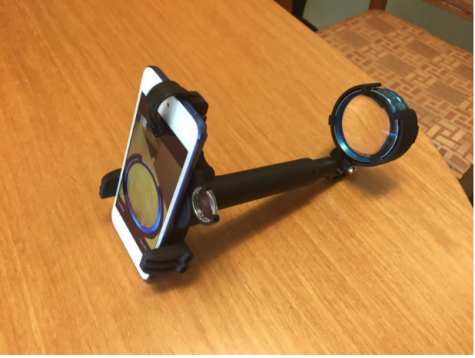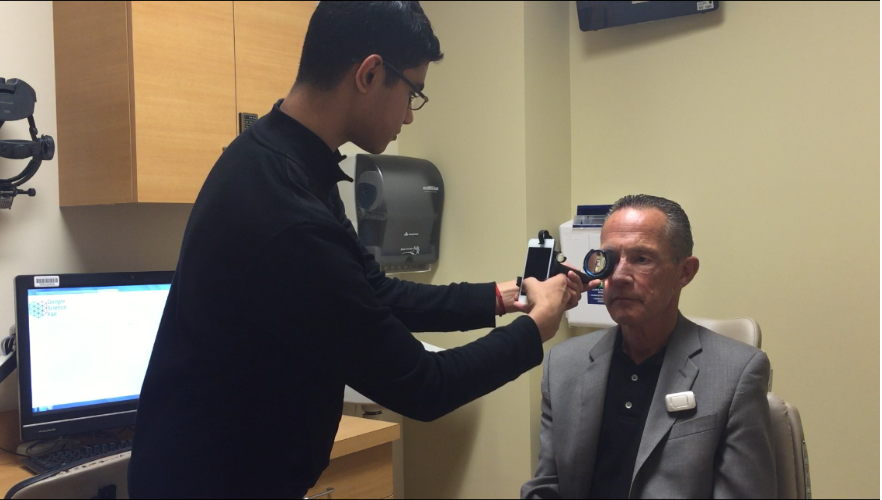Senior named Google Science Fair finalist
Rishab Gargeya’s smartphone app diagnoses eye diseases
Rishab Gargeya
Provided by Rishab Gargeya
Rishab Gargeya demonstrates how the phone and external camera would be used to scan a patient’s eyes. Rishab’s application quickly scans the retina and can identify vision-impairing diseases such as glaucoma and diabetic retinopathy.
August 28, 2016
Rishab Gargeya (12) was named a regional finalist in the 2016 Google Science Fair on July 18 for his development of a smartphone application capable of producing an instant diagnosis for common eye diseases.
The Google Science Fair is a global science competition held online, open to anyone between the ages of 13 and 18. Participants have the opportunity to win different prizes including a $50,000 scholarship offered by Google.
The application uses a deep-learning algorithm developed by Rishab. With the support of a low-cost external camera attachment, it scans the retina for irregularities, eliminating the need for clinical testing and producing an instant diagnosis. Rishab’s application is built to combat widespread vision-impairing diseases such as glaucoma and diabetic retinopathy, both of which lead to irreversible eyesight loss and are very common in underdeveloped regions.
“An automated solution for the early detection of retinal diseases is of immediate need, providing patients with timely access to life-altering diagnostics without dependence on medical specialists in clinical settings,” he writes in his project report. “I hope this project can finally provide a low-cost, accessible solution for early detection of eye disease and blindness prevention.”
Rishab began his research in freshman year. His interest in battling eye disease stemmed from a volunteer experience at an eye care clinic near his grandparents’ home in rural India. By shadowing expert retinal specialists and ophthalmologists, Rishab observed clinical inefficiencies.
“Through [my] experience, I learned of the disparity between the number of doctors available and the large number of patients that needed medical attention,” he said. “Current diagnostic methods are time-consuming and expensive, … thereby leaving many patients undiagnosed and susceptible to vision loss over time.”

An apparatus attached to the iPhone to enable diagnosis. Rishab’s application quickly scans the retina and can identify vision-impairing diseases such as glaucoma and diabetic retinopathy.
Rishab worked with Dr. Sheila John, an ophthalmologist in the Teleophthalmology Department at the Sankara Nethralaya Eye Foundation, to adjust the algorithm and deploy the application at screening camps in rural areas.
“While developing my mobile application, I had to keep in constant contact with various clinicians and push multiple releases to their smartphones, gathering feedback and tweaking my application as well as the underlying algorithm to best fit their needs,” he said.
Despite his success, Rishab still faces obstacles in the development process, most notably working to support the application on a diversity of smartphone devices and promoting usability in a clinical setting.
“I am very grateful and honored to receive this recognition [of] my work,” he said. “I am very excited as to how far I have come, and I look forward to working on [the] next steps in my application.”
To learn more about Rishab’s project, view his project link here: goo.gl/WDL6Bk.
This piece was originally published in the pages of the Winged Post on Aug 26, 2016.


















![“[Building nerf blasters] became this outlet of creativity for me that hasn't been matched by anything else. The process [of] making a build complete to your desire is such a painstakingly difficult process, but I've had to learn from [the skills needed from] soldering to proper painting. There's so many different options for everything, if you think about it, it exists. The best part is [that] if it doesn't exist, you can build it yourself," Ishaan Parate said.](https://harkeraquila.com/wp-content/uploads/2022/08/DSC_8149-900x604.jpg)




![“When I came into high school, I was ready to be a follower. But DECA was a game changer for me. It helped me overcome my fear of public speaking, and it's played such a major role in who I've become today. To be able to successfully lead a chapter of 150 students, an officer team and be one of the upperclassmen I once really admired is something I'm [really] proud of,” Anvitha Tummala ('21) said.](https://harkeraquila.com/wp-content/uploads/2021/07/Screen-Shot-2021-07-25-at-9.50.05-AM-900x594.png)







![“I think getting up in the morning and having a sense of purpose [is exciting]. I think without a certain amount of drive, life is kind of obsolete and mundane, and I think having that every single day is what makes each day unique and kind of makes life exciting,” Neymika Jain (12) said.](https://harkeraquila.com/wp-content/uploads/2017/06/Screen-Shot-2017-06-03-at-4.54.16-PM.png)








![“My slogan is ‘slow feet, don’t eat, and I’m hungry.’ You need to run fast to get where you are–you aren't going to get those championships if you aren't fast,” Angel Cervantes (12) said. “I want to do well in school on my tests and in track and win championships for my team. I live by that, [and] I can do that anywhere: in the classroom or on the field.”](https://harkeraquila.com/wp-content/uploads/2018/06/DSC5146-900x601.jpg)
![“[Volleyball has] taught me how to fall correctly, and another thing it taught is that you don’t have to be the best at something to be good at it. If you just hit the ball in a smart way, then it still scores points and you’re good at it. You could be a background player and still make a much bigger impact on the team than you would think,” Anya Gert (’20) said.](https://harkeraquila.com/wp-content/uploads/2020/06/AnnaGert_JinTuan_HoHPhotoEdited-600x900.jpeg)

![“I'm not nearly there yet, but [my confidence has] definitely been getting better since I was pretty shy and timid coming into Harker my freshman year. I know that there's a lot of people that are really confident in what they do, and I really admire them. Everyone's so driven and that has really pushed me to kind of try to find my own place in high school and be more confident,” Alyssa Huang (’20) said.](https://harkeraquila.com/wp-content/uploads/2020/06/AlyssaHuang_EmilyChen_HoHPhoto-900x749.jpeg)










